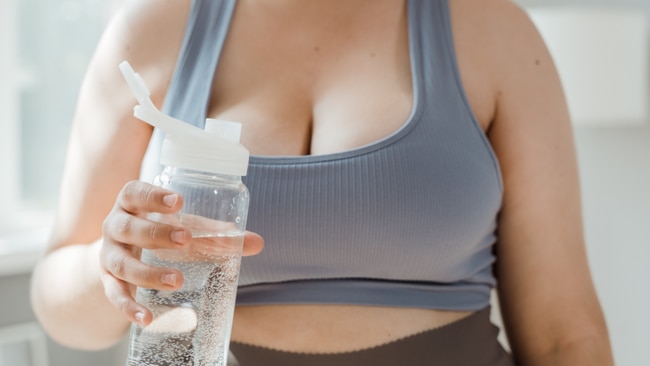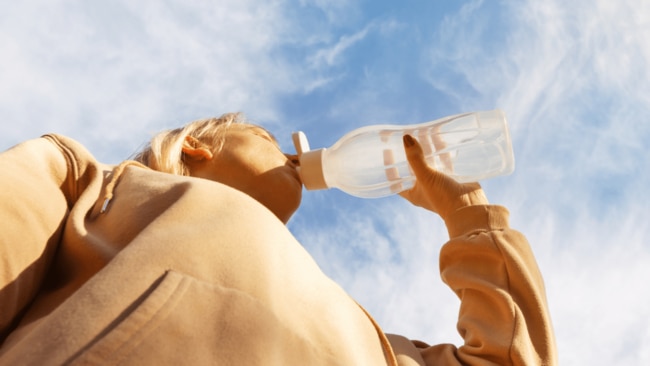'This is what happened when I drank sugar-free cordial instead of water for a month'
It's better than soft drink for a start
Lifestyle
Don't miss out on the headlines from Lifestyle. Followed categories will be added to My News.
After years of drinking well under the recommended amount of water, writer Emily Holgate tried employing a controversial tactic to up her intake and the results were surprising.
Health professionals and wellness gurus alike have long debated the age-old question – how much water do we need to be drinking for optimal health? The general consensus is about two litres a day, although this figure varies based on differing advice.
Up until recently, that number was significantly lower for me. I was consuming two glasses a day max, maybe one litre on a good day, paired with a crippling Diet Coke addiction.
One day my partner, who suffered from the same lack of hydration, came home with a solution to our problem – sugar-free cordial. We knew enough to know consuming sugary drinks in place of water couldn't be good for us, but a sugar-free counterpart posed the perfect workaround.
Like what you see? Sign up to our bodyandsoul.com.au newsletter for more stories like this.
Soon, we were drinking between two to three litres of water a day each, mixed with a small amount of sugar-free cordial. It wasn’t long until I felt more hydrated and became less inclined to reach for the soft drink. But when we admitted this lifestyle change to friends and family, we were met with reactions of shock and befuddlement.
"Surely that can't be good for you?" was the general retaliation as eyes narrowed on the bright green concoction that filled a litre mason jar before them. My defence was often to remind them that the alternative, for us, was severe dehydration (an exaggeration yes, but the point stands). However, it got me thinking: is drinking sugar-free cordial daily actually a better solution to our dilemma?
How much water should we actually be drinking a day
According to Accredited Practising Dietitian Dr Alan Barclay, co-author of The Ultimate Guide to Sugars and Sweeteners, the recommended fluid intake for women is 2.1 litres, or about eight cups a day, where a cup is 250ml and fluids are ideally water. For men, it’s 2.6 litres, or about 10 cups a day. Dr Barclay adds that a more precise quantity to aim for is 35-45 ml per kilogram.
That being said, it’s increasingly clear that the 500ml of water I was previously drinking was not near enough for optimal hydration. But what function does water serve other than hydration? We’ve all likely heard the adage about how our body comprises almost 70 per cent water, so it should come as no surprise that it’s an essential requirement for our daily health.

Particularly amid summer in Australia, Dr Barclay says drinking enough fluids is essential for regulating our body temperature. Water is also a vital nutrient for assisting with digestion, metabolism and secretion of waste. “All of our body’s metabolic processes happen in our cells, so water helps with the absorption of nutrients from food,” Dr Barclay explains.
But does adding flavouring or a non-sugar sweetener diminish these effects?
Dr Barclay says when using very small amounts of intense sweeteners in water, we’re still consuming well under the recommended daily intake of these sweeteners, which are strictly regulated by Food Standards Australia and New Zealand (FSANZ).
“It’s still mostly water, with a little bit of sweetness to make it taste better,” Dr Barclay explains. “With humans, the first food they ever had is breast milk which is sweet, so it’s not surprising people have a preference for sweetness. It’s not in itself a bad thing if adding a little bit of sweetness to have water taste better is a strategy to help you drink more fluids overall.”
What happened after a month of drinking sugar-free cordial?
Like starting any new habit, I was excited to embark on my hydration quest, with the aid of my new ally: sugar-free cordial. I bought myself a one-litre Frank Green ‘emotional support water bottle’ (as advised by the army of well-hydrated girls on TikTok) and decorated it in cute stickers to encourage my consumption. My partner and I purchased three types of sugar-free cordial, just to keep things spicy. If it wasn’t already obvious, we require a lot of incentive to drink water.
The selection included Cottee’s Zero Sugar lime, raspberry and apple and plain raspberry. Luckily, the benefit of my new giant, opaque drink bottle was knowing that those surrounding me would be none the wiser and that it was filled with cordial, which seemed the safe option after seeing my partner bear the judgement that came with his transparent mason jar.
I will admit, there was something about the juvenile nature of drinking cordial through a large, adult sippy cup that made me giddy. Sitting on a train surrounded by commuters or in the office with colleagues and their boring bottles of regular water, I felt a sense of empowerment from gatekeeping my secret. ‘Who’s hydrated now?’ I thought smugly as I sipped from my Frank Green bottle, with the type of self-importance that only comes with drinking from a trending bottle (or Stanley Cup, for that matter).
Of course, upping my water intake meant more frequent trips to the bathroom – although my smugness was retained upon seeing my urine transform from fluorescent to translucent, the sign of a truly hydrated person. I also noticed after a couple of weeks of drinking two to three litres of (diluted) sugar-free cordial a day, that my typical afternoon brain fog significantly lifted. I had more energy, could think more clearly and was digesting food better after previously struggling with bloating and cramps after meals.
All in all, I felt most of the subtle but nonetheless positive effects that I expected to come with increasing my water intake. I’ve always struggled with acne, so luckily my experiment with non-sugar cordial also came with benefits for my skin. My hormonal acne persisted, but small daily bumps, blackheads and redness improved, as did the general texture and glow of my complexion. From a personal and completely amateur perspective, I’d say it was a success.
Is sugar-free cordial a viable solution to dehydration?
Although it helped with the small feat of conquering dehydration, I still wondered what the effects were of regularly consuming sugar-free cordials in place of water. I was familiar with the media coverage of studies on artificial sweeteners and the effects they may have on our health, including links to diseases such as cancer.
Last year, the World Health Organisation (WHO) updated its guidelines on the use of non-sugar sweeteners, suggesting that they should “not be used as a means of achieving weight control or reducing the risk of noncommunicable diseases”. The guidelines also state that there may be “potential undesirable effects from long-term use of non-sugar sweeteners, such as an increased risk of type 2 diabetes, cardiovascular diseases, and mortality in adults”.

Of course, it’s important to consume everything, including sugar-free sweeteners, in moderation. However, an academic review published in the European Journal of Clinical Nutrition in November called for a re-evaluation of the WHO’s guidelines on the basis that it gave too much weight to observational studies, particularly long-term prospective cohort studies, rather than randomised-control trials.
“The WHO put the weight of their opinion on those observational studies and a lot would argue that's wrong,” Dr Barclay notes. “Plus monk fruit and stevia aren't involved in observational studies as they’ve only been available for about 10 years. They’re plant extracts and they’re natural, while the studies go back to sweeteners like aspartame, sucralose and saccharin, which are more artificial … but they're all digested, absorbed and excreted differently so it’s a fundamental flaw to lump them all together.”
Other recent research has also suggested a carcinogenic link with the sweetener aspartame. But Dr Barclay explains that this is nothing for Australians to panic about, as the FSANZ have their own guidelines in place to keep us safe.
“The reality is, to have adverse effects you need to have more than the acceptable daily intake, and most people have less than 10 per cent of that,” he says. “With the link between aspartame and cancer, you’d need to have more than 14 cans of no-sugar soft drinks each day for your whole life, or 75 sachets of sweeteners, which no one does in this country.”
Non-profit group Cancer Council Australia also confirmed that sweeteners approved for use in Australia are strictly regulated by the FSANZ, and highlighted that the peak organisation for research into the role of diet in cancer, the World Cancer Research Fund, stated that there was no strong evidence that drinks made with intense sweeteners are a cause of cancer. For reference, the amount of aspartame that is deemed safe is 2800mg per day, compared to the average can of soft drink which contains about 200mg.
With all of this in mind, I’m far less sceptical of drinking small amounts of non-sugar cordial to help increase my daily water consumption and improve hydration. However, in the long term, I might opt for more natural sugar-free cordials made from monk fruit or stevia, such as Bickford’s. Maybe I’ll even progress to fresh fruit or citrus in my drink bottle as a completely natural flavouring.
And maybe, just maybe, I’ll (eventually) grow up and graduate to plain water, and no longer need to hide behind the facade of my Frank Green bottle.
More Coverage
Originally published as 'This is what happened when I drank sugar-free cordial instead of water for a month'




